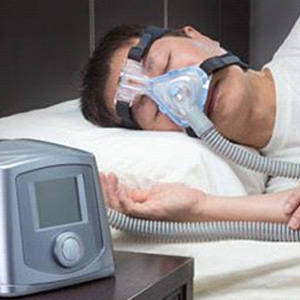Some people don’t like wearing a CPAP mask for treatment of their sleep apnea. Even though it is considered the gold standard for treatment, many forgo treatment because they don’t care for the way the mask fits or feel claustrophobic wearing something over their nose and mouth during sleep. For patients that are prescribed CPAP machines, up to 86% don’t comply with treatment. But not treating sleep apnea can have significant side effects including diabetes, high blood pressure, hypertension, congestive heart failure, atrial fibrillation, coronary artery disease, daytime sleepiness, and even sudden cardiac death. Sleep apnea is a sleep disorder in which a person stops breathing periodically during sleep.
Episodes can last for a few seconds and can occur up to 20 – 30 times a night. Symptoms of sleep apnea can include daytime drowsiness, waking up with a headache or sore jaw and loud snoring. Take our sleep survey to learn more. If you have been diagnosed with sleep apnea, your risk of a heart attack is 23 times greater than that of someone without the disorder. Ninety-two percent of stroke victims unknowingly live with sleep apnea before having a stroke. Fortunately for many, alternative treatment options are emerging with excellent results in managing sleep apnea symptoms. It’s important to remember to always check with your healthcare professionals and sleep team before changing your prescribed treatment. Learn what the American Sleep Association says about Oral Appliances as an effective alternative treatment to CPAP.
APAP and BiPAP
For some patients who can’t tolerate CPAP, an APAP or Auto Positive Airway Pressure machine might be a better alternative. Instead of delivering air via set pressure like a CPAP, the APAP adjusts to your ideal pressure. A BiPAP is a like an APAP, but the air is sent through a mask that fits over only the nose, which allows for low-pressure airflow during a patient’s exhalation cycle.
Oral Appliances
Many patients with mild to moderate sleep apnea are referred back to their dentists for treatment and fitted for an appliance worn over the lower teeth. One appliance also called a MAD or Mandibular Advancement Device positions the jaw slightly forward which helps keep the soft tissues of the throat, tongue, tonsils, or soft palate open. Another device called a Tongue Retaining Device holds the tongue in a forward position during sleep.
Weight-Loss Management
Obesity is one of the major contributors to obstructive sleep apnea, and some have found that losing excess weight improved their symptoms of sleep apnea and in some cases cured it all together. If you are overweight or obese, dropping just 10% of your body weight can reduce or alleviate symptoms of sleep apnea.
Positional Therapy
Sleep apnea can affect anyone, but some people only experience episodes of sleep apnea while sleeping on their backs. For those people, wearing a special belt that prevents you from rolling onto your back can help reduce symptoms.
Lifestyle Changes
Studies have shown symptoms of sleep apnea are made worse by smoking and drinking alcohol up to four hours before bedtime. Alcohol relaxes the muscles and can cause your airway to collapse during sleep. While there are so many reasons to quit smoking and drinking alcohol, the thought of not having to wear a CPAP could be motivation enough to quit.
Surgery
While it might be the last resort for many, surgery for treatment of obstructive sleep apnea could help alleviate the immediate need for a CPAP machine. However, it is an invasive procedure with a lengthy healing period and may not be a permanent solution. For patients with mild to moderate sleep apnea who can’t or won’t comply with CPAP therapy, there are many treatment options available. You and your doctor can find a solution to help you get the sleep you need. Click here to learn more about how CPAP alternatives work!

